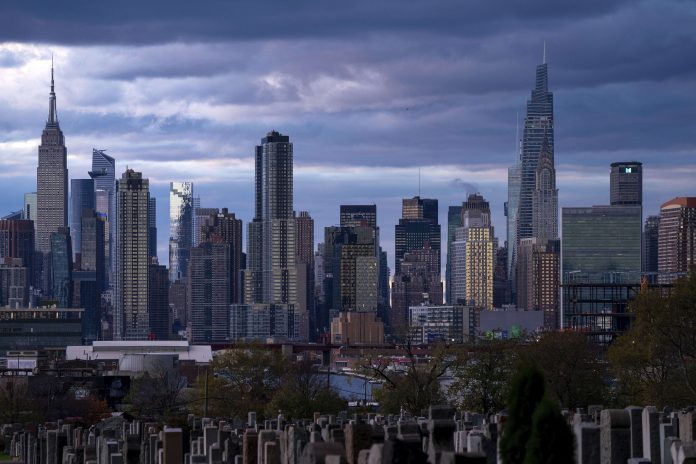
By MIKE SCHNEIDER
Associated Press
A misplaced naval ship in California. Overlooked college students in New York City. Missed inmates in Texas. These are some of the reasons why the two most populous states and the largest city in the U.S. filed last-minute requests for corrections to their 2020 census figures right before the deadline at the end of last month. California, Texas and New York City were joined by a dozen and a half other stragglers, including Illinois and New Orleans, that made down-to-the-deadline appeals over the numbers that help determine political power and the annual distribution of $2.8 trillion in federal funding.
In total, nearly 200 requests for corrections were filed by local, state and tribal governments through two programs started by the U.S. Census Bureau to give governments opportunities to have their population totals reviewed and corrected if need be.
If successful, any corrections will be applied only to future population estimates used for the rest of the decade in determining federal funding. They can’t be used to change how many congressional seats each state was allotted during the apportionment process, nor for the data used for redrawing political districts. That’s too bad for some cities and states — not to mention the two major political parties fighting over every foot of territory in a closely divided nation.
If the Democratic-leaning state of New York had counted 89 more residents — the equivalent of a small apartment building’s tenants in New York City — during the 2020 census, it wouldn’t have lost a congressional seat. Among Republican-controlled states, Texas had been expected to gain three additional congressional seats instead of the two it gained after the 2020 census.
In one of the most unusual reasons given for a correction request, sailors on an aircraft carrier in Southern California may have been assigned to the wrong city’s population because of the location of the ship’s slip.
Here’s a look at some of the last-minute requests for corrections made by states and cities:
CALIFORNIA
The slip-up, so to speak, reportedly took place on the aircraft carrier USS Abraham Lincoln. California officials believe its more than 5,000 crew members were wrongly assigned to San Diego’s population total instead of neighboring National City’s figures. Although part of the ship is located in San Diego, officials said what matters is where crew members get off and on the ship: the part of Naval Base San Diego in National City.
“Kansas doesn’t have this problem,” said H.D. Palmer, deputy director of external affairs for the Department of Finance in California, the most populated U.S. state with 39 million residents.
California officials also contend that almost 10,000 college students and inmates were overlooked during the census. They were among the most difficult to count as campuses closed and prisons were locked down at the start of the COVID-19 pandemic, which coincided with the beginning of the head count. The Census Bureau created a separate program to handle these challenges.
California officials said they waited until the deadline to make their filings because they wanted to first see if local municipalities would file requests.
ILLINOIS
Illinois, the sixth most populous U.S. state with 12.5 million residents, was one of six states that had undercounts of its population, according to the Census Bureau. In his correction request, Gov. JB Pritzker didn’t specify how many people he believes were missed but cited the bureau’s estimate of almost 2% of the population. Among the omissions were residents in nursing homes, dorms, homeless shelters, residential treatment facilities and jails, Pritzker said in one of two letters submitted to the Census Bureau.
“Because of an inaccurate census count, the state of Illinois received inadequate federal funding for Medicare, affordable housing, homeland security and a number of other essential programs,” said Alex Gough, a spokesperson for the governor’s office.
NEW ORLEANS
New Orleans Mayor LaToya Cantrell said in a letter to the Census Bureau that 1,061 students living in dorms at Tulane University and Southern University appeared to have been missed as campuses emptied out due to the pandemic.
NEW YORK CITY
New York City officials believe 1,300 residents were overlooked. The head count may have missed an 800-bed jail and omitted or undercounted students living in dorms at Hunter College, Pace University and Wagner College, officials in the city’s planning department said in a letter to the Census Bureau. The city waited until the deadline to file its challenge so it could conduct a thorough evaluation of the figures, said officials in the most populous U.S. city, with 8.3 million residents.
TEXAS
Texas is asking the Census Bureau to review whether the count missed more than 41,000 residents living in prisons, nursing facilities, psychiatric hospitals and student housing. Texas officials said they waited until the deadline to file requests because of the number of institutions they needed to contact to confirm what they believed were the correct totals and the complexities of the bureau’s requirements. Texas is the second most populous state in the U.S. with 30 million residents.
“Texas is particularly challenging because of its size,” said Helen You, associate director of the Texas Demographic Center.



















